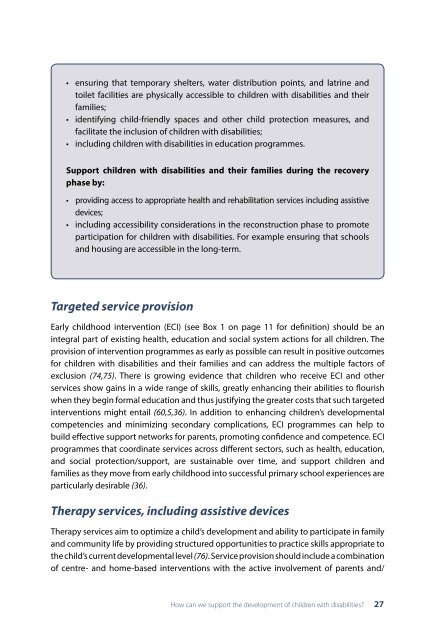Early Childhood Development and Disability: - World Health ...
Early Childhood Development and Disability: - World Health ...
Early Childhood Development and Disability: - World Health ...
Create successful ePaper yourself
Turn your PDF publications into a flip-book with our unique Google optimized e-Paper software.
• ensuring that temporary shelters, water distribution points, <strong>and</strong> latrine <strong>and</strong><br />
toilet facilities are physically accessible to children with disabilities <strong>and</strong> their<br />
families;<br />
• identifying child-friendly spaces <strong>and</strong> other child protection measures, <strong>and</strong><br />
facilitate the inclusion of children with disabilities;<br />
• including children with disabilities in education programmes.<br />
Support children with disabilities <strong>and</strong> their families during the recovery<br />
phase by:<br />
• providing access to appropriate health <strong>and</strong> rehabilitation services including assistive<br />
devices;<br />
• including accessibility considerations in the reconstruction phase to promote<br />
participation for children with disabilities. For example ensuring that schools<br />
<strong>and</strong> housing are accessible in the long-term.<br />
Targeted service provision<br />
<strong>Early</strong> childhood intervention (ECI) (see Box 1 on page 11 for definition) should be an<br />
integral part of existing health, education <strong>and</strong> social system actions for all children. The<br />
provision of intervention programmes as early as possible can result in positive outcomes<br />
for children with disabilities <strong>and</strong> their families <strong>and</strong> can address the multiple factors of<br />
exclusion (74,75). There is growing evidence that children who receive ECI <strong>and</strong> other<br />
services show gains in a wide range of skills, greatly enhancing their abilities to flourish<br />
when they begin formal education <strong>and</strong> thus justifying the greater costs that such targeted<br />
interventions might entail (60,5,36). In addition to enhancing children’s developmental<br />
competencies <strong>and</strong> minimizing secondary complications, ECI programmes can help to<br />
build effective support networks for parents, promoting confidence <strong>and</strong> competence. ECI<br />
programmes that coordinate services across different sectors, such as health, education,<br />
<strong>and</strong> social protection/support, are sustainable over time, <strong>and</strong> support children <strong>and</strong><br />
families as they move from early childhood into successful primary school experiences are<br />
particularly desirable (36).<br />
Therapy services, including assistive devices<br />
Therapy services aim to optimize a child’s development <strong>and</strong> ability to participate in family<br />
<strong>and</strong> community life by providing structured opportunities to practice skills appropriate to<br />
the child’s current developmental level (76). Service provision should include a combination<br />
of centre- <strong>and</strong> home-based interventions with the active involvement of parents <strong>and</strong>/<br />
How can we support the development of children with disabilities? 27

















